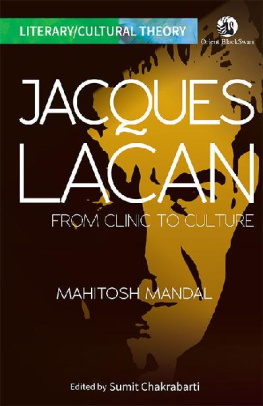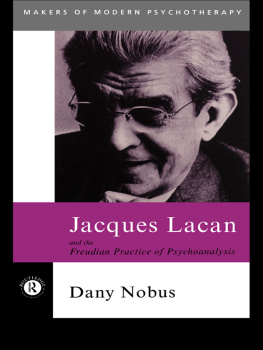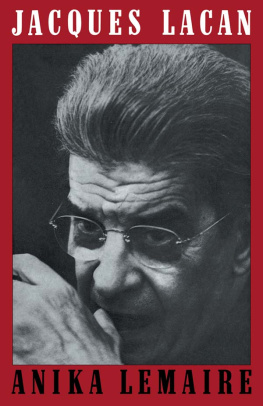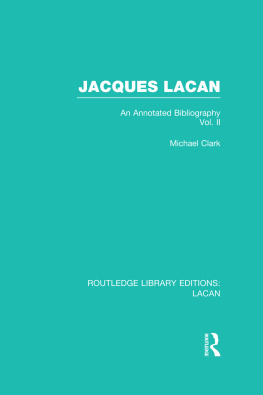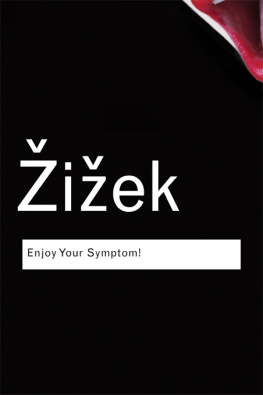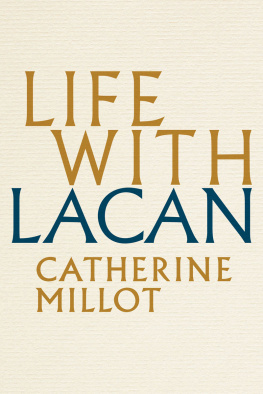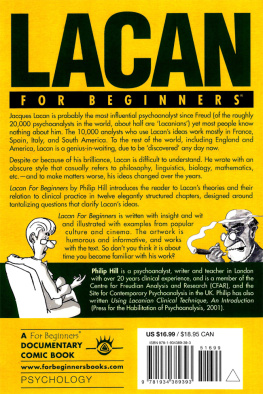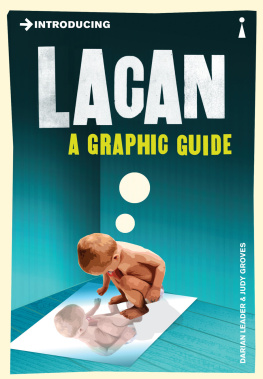Mahitosh Mandal - Jacques Lacan: From Clinic to Culture
Here you can read online Mahitosh Mandal - Jacques Lacan: From Clinic to Culture full text of the book (entire story) in english for free. Download pdf and epub, get meaning, cover and reviews about this ebook. year: 2019, genre: Religion. Description of the work, (preface) as well as reviews are available. Best literature library LitArk.com created for fans of good reading and offers a wide selection of genres:
Romance novel
Science fiction
Adventure
Detective
Science
History
Home and family
Prose
Art
Politics
Computer
Non-fiction
Religion
Business
Children
Humor
Choose a favorite category and find really read worthwhile books. Enjoy immersion in the world of imagination, feel the emotions of the characters or learn something new for yourself, make an fascinating discovery.
- Book:Jacques Lacan: From Clinic to Culture
- Author:
- Genre:
- Year:2019
- Rating:3 / 5
- Favourites:Add to favourites
- Your mark:
- 60
- 1
- 2
- 3
- 4
- 5
Jacques Lacan: From Clinic to Culture: summary, description and annotation
We offer to read an annotation, description, summary or preface (depends on what the author of the book "Jacques Lacan: From Clinic to Culture" wrote himself). If you haven't found the necessary information about the book — write in the comments, we will try to find it.
Jacques Lacan: From Clinic to Culture — read online for free the complete book (whole text) full work
Below is the text of the book, divided by pages. System saving the place of the last page read, allows you to conveniently read the book "Jacques Lacan: From Clinic to Culture" online for free, without having to search again every time where you left off. Put a bookmark, and you can go to the page where you finished reading at any time.
Font size:
Interval:
Bookmark:

LITERARY/CULTURAL THEORY
JACQUES LACAN
For our entire range of books please use search strings "Orient BlackSwan", "Universities Press India" and "Permanent Black" in store.
Literary/Cultural Theory provides concise and lucid introductions to a range of key concepts and theorists in contemporary literary and cultural theory. Original and contemporary in presentation, and eschewing jargon, each book in the series presents students of humanities and social sciences exhaustive overviews of theories and theorists, while also introducing them to the mechanics of reading literary/cultural texts using critical tools. Each book also carries glossaries of key terms and ideas, and pointers for further reading and research. Written by scholar-teachers who have taught critical theory for years, and vetted by some of the foremost experts in the field, the series Literary/Cultural Theory is indispensable to students and teachers.
Series editor
Allen Hibbard
Middle Tennessee State University
Andrew Slade
University of Dayton
Herman Rapaport
Wake Forest University
Imre Szeman
University of Alberta
Krishna Sen
University of Calcutta
Scott Slovic
University of Idaho
Sumit Chakrabarti
Presidency University, Kolkata
LITERARY/CULTURAL THEORY
JACQUES LACAN
FROM CLINIC TO CULTURE
MAHITOSH MANDAL
Presidency University, Kolkata
Edited by
SUMIT CHAKRABARTI
Presidency University, Kolkata

Publishers Acknowledgements
Eyes a man could drown in: Phallic Myth and Femininity in John Fowless The French Lieutenants Woman, by Mahitosh Mandal. First published in Interdisciplinary Literary Studies, Vol. 19, No. 3, 2017. Copyright 2017 The Pennsylvania State University, University Park, PA. This article is used by permission of The Pennsylvania State University Press.
Every effort has been made to trace copyright holders and to obtain their permission for the use of copyright material. The publisher apologises for any errors or omissions made, and would be grateful if notified of any corrections that should be incorporated in future reprints or editions of this book.
JACQUES LACAN: FROM CLINIC TO CULTURE
ORIENT BLACKSWAN PRIVATE LIMITED
Registered Office
3-6-752 Himayatnagar, Hyderabad 500 029, Telangana, India
e-mail:
Other Offices
Bengaluru, Bhopal, Chennai, Guwahati, Hyderabad, Jaipur, Kolkata, Lucknow, Mumbai, New Delhi, Noida, Patna, Visakhapatnam
Orient Blackswan Private Limited 2018
First published 2018
eISBN 9789352876433
e-edition: First Published 2019
e-Pub Conversion:All rights reserved. No part of this publication may be reproduced, distributed, or transmitted in any form or by any means, including photocopying, recording, or other electronic or mechanical methods, without the prior written permission of the publisher, except in the case of brief quotations embodied in critical reviews and certain other noncommercial uses permitted by copyright law. For permission requests write to the publisher.
Dedicated to my parents, who let me pursue my dreams
Acknowledgements
Three of my teachers from the Department of English, Jadavpur University, have played an instrumental role in the writing of this book: Dr Santanu Biswas, Dr Nandini Saha and Dr Chandreyee Niyogi. Dr Biswas, a Lacanian scholar and a practicing Lacanian analyst, sparked my interest in Lacan through a number of undergraduate and postgraduate courses (which I attended between 2006 and 2010) on the interface between literature and Lacanian psychoanalysis. Dr Saha, who worked on the English novelist John Fowles, supervised my MPhil dissertation on a Lacanian study of Fowles. Dr Niyogi, who is currently supervising my PhD thesis on Swami Vivekananda, encouraged me to write this book even though doing so meant I had to take some time off from writing my thesis.
Dr Sumit Chakrabarti, my senior colleague at the Department of English, Presidency University, and the series editor, gave me the opportunity to write this book and offered invaluable advice while putting up with my deferrals.
I am also indebted to the following colleagues of mine from the Department of English, Presidency University, for their constant support and encouragement: Dr Shanta Dutta, Dr Purna Banerjee, Dr Souvik Mukherjee, Dr Amrita Sen, Dr Anupama Mohan, Dr Suddhasheel Sen, Dr Shuhita Bhattacharjee, Kalyan Das and Anirban Ray.
Swami Suparnananda, secretary of Ramakrishna Mission Institute of Culture, Golpark, and Dr Angshuman Bhattacharjee, Professor of Philosophy at Ramakrishna Mission Residential College, Narendrapur, have shaped my life in more ways than one.
Teaching Lacan to my students at Presidency University has been a rewarding experience. Their questions and the clarifications they sought led me to delve deep into the subject.
For some time I was associated with and benefitted from two study groups: (1) The Lacan Study Group, run under my supervision at Presidency University, which comprised the following Lacan enthusiasts Sayantika Chakraborty, Prabaha Tarafder, Sanjay Dey, Subham Chowdhury, Samudranil Gupta, Swayamdipta Das, Sauryendu Dasgupta, Subhayu Bhattacharjee, Souvik Mukherjee and Soumili Mandal. Sayantika, in particular, made important contributions to the LSG and ensured it ran smoothly for two long years. And (2) The Lacan Study Circle, Kolkata, which was run under the supervision of Dr Biswas and included the following colleagues and friends Anindya Sengupta, Samya Seth, Dipanjan Maitra, Arka Chattopadhyay, Anik Samanta, Sukhaloka Mukherjee and Arijit Mitra.
Anushree Das, studying Mathematics at Presidency University, helped me by clarifying some of the mathematical concepts used by Lacan.
My experience ofworking with the team at Orient BlackSwan, in particular with Sreenath Sreedharan and Bikram Sharma, has been enriching.
I express my heartfelt gratitude to each of them.
The section on The French Lieutenants Woman in Chapter Four is a reprint of my article published in Interdisciplinary Literary Studies: A Journal of Criticism and Theory, Vol. 19, No. 3 (2017). I am grateful to The Pennsylvania State University Press for granting me permission to use the article in this book.
Editor's Preface
This book on Jacques Lacan emerges directly, yet reflexively, out of literary practice. Both the author and the editor are students (and also teachers) of literature. There is a complex interconnectedness between many modernities discussed and/or practised in the humanities classroom, and in spite of shifts within narratives of engagement with the political nature of the study of the humanities, subjecthood has remained a central problem. The prevarications of postmodernity (and this is not a pejorative overture), with their emphases on contingency and parody, have rarely been able to occlude certain generic disclaimers on the question of the subject. Psychoanalysis, to use the term loosely, has therefore remained, in spite of shifting epistemes, as a modernist marker of our engagement with the question of the human. A considerable part of psychoanalytic practice is irreducibly assigned, in Derridean interpretations, to the prioritisation of logocentrism within clinical praxes, a symptomatic positivism founded, if not on faith, on practical compulsion. This book is a grounded critique of such a reductive reading of the psychoanalytic. The world of language, characterised by logocentrism and phallogocentrism, predominantly constitutes only one of the three Lacanian registers that of the symbolic. There are two more psychical registers the imaginary and the real which are by no means logocentric. These three registers variously contribute to the formation of human subjectivity, according to Lacan, but one must note their differences. For instance, while the symbolic structures sexual desire, the real registers the traumatic and the imaginary is what determines how human fantasy works. The traumatic is neither experienced nor fully articulated through the
Next pageFont size:
Interval:
Bookmark:
Similar books «Jacques Lacan: From Clinic to Culture»
Look at similar books to Jacques Lacan: From Clinic to Culture. We have selected literature similar in name and meaning in the hope of providing readers with more options to find new, interesting, not yet read works.
Discussion, reviews of the book Jacques Lacan: From Clinic to Culture and just readers' own opinions. Leave your comments, write what you think about the work, its meaning or the main characters. Specify what exactly you liked and what you didn't like, and why you think so.

